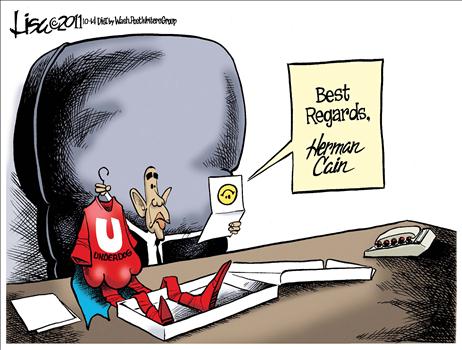It’s Monday, October 17th, 2011….and here’s the Gouge!
First up, the WSJ details a ray of sunshine in a heretofore darkening sky:
ObamaCare Starts to Unravel
The real story behind the Class program failure, and what to do now.
Now that one of ObamaCare’s major new benefit programs has been scrapped, liberals are trying to make stone soup by claiming that the Obama Administration merely committed an act of “good government.” They claim that when this long-term care insurance program proved to be unworkable, the Administration conceded as much, and now it’s gone. So let’s review the evidence, not least because it so perfectly illustrates the recklessness that produced the Affordable Care Act.
When Democrats were pasting it together in 2009 and 2010, the immediate attraction of the program known by the acronym Class was that its finances could be gamed to create the illusion that a new entitlement would reduce the deficit. Ending the complicated Class budget gimmick erases the better part of ObamaCare’s purported “savings,” but it’s also worth focusing on the program’s long-run political goals.
For decades Democrats have been trying to put government on the hook for middle-class costs like home health services ($1,800 a month on average) and nursing homes ($70,000 to $80,000 per year). On paper, Class was supposed to be like normal insurance, funding benefits through premiums with no subsidy. But since the budget gimmick and the program’s larger structure meant that premiums could never cover benefits, Democrats were trying to force a future Congress to prevent a Class bankruptcy using taxpayer dollars.
As the costs to the federal fisc continued to climb, the Democratic gambit was that Class would gradually morph into another part of Medicare. Insurance depends on younger, healthier people signing up to cross-subsidize the older and sicker, but under the Class program as written almost all of its enrollees would soon also be beneficiaries.
So to fix this “adverse selection,” the plan was for Congress to eventually make participation mandatory, with the so-called premiums converted into another payroll tax and the benefits into another entitlement. Former White House budget director Peter Orszag has been writing that the long-term care insurance market can’t function without a mandate, while HHS Secretary Kathleen Sebelius declined to rule one out at a Senate hearing in February. Now they tell us.
The only reason the Health and Human Services Department pre-emptively called off this scheme is that former New Hampshire Senator Judd Gregg succeeded in inserting a proviso that required the Class program’s reality to match Democratic promises as a matter of law. If HHS couldn’t provide “an actuarial analysis of the 75-year costs of the program that ensures solvency throughout such 75-year period,” it couldn’t be legally implemented.
In other words, HHS had to prove that the Class program wouldn’t go broke the way it was designed to—and actuarial analysis is a matter of math, not politics. In a 48-page report that HHS submitted to Congress Friday, the department concedes that it is literally impossible to create any kind of long-term care program under the law’s statutory text in which revenues match expenditures. Such a plan would cost as much as $3,000 per month, which no one would ever buy.
The HHS gnomes even considered “features deviating from or going beyond a plain reading of the statutory language” that its lawyers didn’t think could pass legal muster, and they still couldn’t avoid violating the known laws of mathematics despite 19 months of trying. HHS lawyers also said the government would have to warn enrollees that the promised benefits weren’t contracts and could be abrogated to “dispel any claims that the Class program had misled the public or had encouraged reliance on its programs under false pretenses.”
Those pretenses have been obvious all along, with outside analysts and internal Administration experts saying Class wasn’t viable. President Obama was a mask of indifference with no response when Paul Ryan took Class apart at the 2010 White House health summit. Democrats included it anyway, but now that the Administration itself has vindicated its critics, Republicans have a new political opportunity to make real health-care legislative progress.
At a minimum the GOP could begin by repealing the Class program altogether, since its legal authority is still intact. “One should never leave a partly loaded gun on the table, even if most of the chambers are empty or just house blanks,” writes the American Enterprise Institute’s Tom Miller. He also suggests attaching a few of the more destructive provisions and forcing Democrats to defend them, such as Mr. Orszag’s Independent Payment Advisory Board of 15 political appointees who have broad unaccountable powers to control health-care markets and health care.
Our suggestion is for a Gregg-like amendment that applies to the entire health law and not simply Class. If reality can’t match the rhetoric that accompanied the bill—about fiscal responsibility, bending the cost curve, keeping your health care if you like your health care and all the other false promises—then, legally, it should be repealed like Class. Call it a truth-in-advertising clause. ObamaCare would collapse in a heartbeat.
Why stop with ObamaScare; what could be more reasonable than a similar standard be applied to every piece of legislation any level of government imposes on the public?!?
Speaking of reasonableness, as Jonah Goldberg suggests, like so much else, Team Tick-Tock misunderstands the concept:
The Diminishing Returns of Reasonableness
Should we bomb Iran for plotting to blow up a Washington, D.C. restaurant in order to assassinate the Saudi ambassador? Probably not.
Should Iran be worried that we might? Absolutely.
And yet, within hours of the Justice Department charging elements within the Iranian government (the Quds Force of the Iranian Revolutionary Guard) of scheming to commit an act of war against us, the administration made it clear that it wanted a diplomatic response to the foiled scheme. A Pentagon spokesman explained: “The U.S. military has longstanding concerns about Iran’s malign influence in the region. But with respect to this case, it is a judicial and diplomatic issue.” Never mind that the “region” in this instance just happened to be two miles from the White House.
White House spokesman Jay Carney quickly reassured everyone that the White House would focus “on working through economic measures, sanctions, as well as diplomatic measures to isolate Iran.”
By the time the president addressed the plot on Thursday, it came as no surprise when he said his administration’s first priority would be the criminal prosecution of the alleged perpetrator and then a lot more paper-pushing and talk.
Obama might be right that violence isn’t the answer. But why the rush to say so?
I think the explanation is more philosophical and psychological than tactical or strategic. It’s hardly controversial to say that the Obama administration prefers legalistic, multilateral and diplomatic solutions to abiding problems rather than military ones.
A far more controversial claim is that Republican administrations, not to mention conservative hawks, prefer legal, multilateral and diplomatic solutions to problems, too. But it also happens to be true. George W. Bush spent a lot of time at the U.N. before we invaded Iraq. He never resorted to military action against Iran or North Korea, despite the utter futility of diplomatic efforts and economic sanctions. Sure, the right is probably more eager to use force, but it’s also more eager to seem like it will.
The philosophical divide between mainstream hawks and mainstream doves is hardly absolute. Obama ordered the bombing of Libya and the killing of Osama bin Laden. In his Nobel Peace Prize speech, Obama wisely, albeit awkwardly, conceded that the aphorism “violence never solved anything” is wrong. “To say that force is sometimes necessary is not a call to cynicism — it is a recognition of history, the imperfections of man and the limits of reason.”
One might ask: What else does Iran have to do to demonstrate the diminishing returns of reasonableness? It’s been killing Americans in Iraq and Afghanistan. Obama’s own Treasury Department announced in July that Iran has formed a strategic partnership with al-Qaeda. It murdered its own citizens when they organized to demand democracy — precisely the sort of despotic behavior Obama says justified regime change in Libya. It’s the chief sponsor of terrorism in the Middle East, and it has exported terror all around the globe.
Again, I’m not arguing for dropping a bomb on the Quds’ headquarters, though I can’t say I’d mind it if we did. But I see nothing wrong with the Iranians thinking we might.
And that’s this administration’s problem: It has an obsession with the appearance of reasonableness.
It doesn’t fully appreciate that the threat of force is what encourages reasonableness in many quarters of the globe. Ronald Reagan was happy to negotiate with the Soviets, but he also kept them wondering if he might bomb before breakfast. Teddy Roosevelt spoke softly because he carried a big stick.
Just look at Israel’s problems these days. The White House signaled that it would pursue what amounted to a new policy of even-handedness between the Israelis and Palestinians. In ways large and small, it put slack in the bond between the U.S. and Israel.
What happened next? Turkey began demonizing Israel and saber-rattling in her direction. Palestinians opted to end-run the “peace process” and go straight to the U.N. for statehood. The junta ruling Egypt has played footsie with anti-Israel mobs.
North Korea hasn’t refrained from invading South Korea because it’s against the law, nor has China left Taiwan alone out of a passion for reasonableness.
In short, the fear that the U.S. will do what it takes to defend its national interests, allies and ideals is what makes it possible to hash out our disagreements in swank European conference rooms. Lose the fear, lose the incentive for reasonableness.
Iran won’t even consider being reasonable until it’s afraid of us. And immediately ruling out anything but talk after every insult isn’t very scary.
Turning from the willfully blind to the woefully dumb, as today’s Tales From the Darkside details, this apple didn’t fall far from tree….
Rep. Jesse Jackson Calls on Government to Hire All Unemployed Americans for $40,000 Each
Rep. Jesse Jackson Jr. has offered his own $804 billion jobs plan that calls on the federal government to hire the nation’s 15 million unemployed Americans for jobs paying roughly $40,000 each, and bail out all the states and cities facing budget crises.
In an interview with the Daily Caller on Wednesday, the Illinois Democrat applauded President Obamafor directing his staff to greenlight job-creating initiatives without congressional approval after his $447 billion jobs billwas defeated in the Senate this week.
“Now we’re making some progress,” Jackson said, comparing the legislative gridlock in Congress to the states that seceded from the union during the Civil War. “We’ve seen Congress is in rebellion,” he said, “determined to wreck or ruin at all costs.”
Jackson said the government’s direct hiring of the nation’s 15 million unemployed Americans would cost $600 billion. “It could be a five-year program,” he said. “For another $104 billion, we bail out all of the states. For another $100 billion, we bail out all of the cities.”
“We put people to work cleaning up communities. We put people to work through a civilian conservation corps, through a Works Progress Administration because the hour demands it,” he said.
“And as more people work, they pay taxes, they pay taxes into the 4th quarter, they buy wares, they buy homes, they meet their obligations and our economy begins to work its way out of this protracted recession,” he continued. “That’s the only way out of this crisis. And I hope the president begins to continue to exercise extraordinary constitutional means based on the history of Congresses that have been in rebellion in the past.”
But not everyone is convinced that Jackson’s plan would work. Even a fellow Democrat has criticized it.
“In Rep. Jackson’s entire congressional career, he has never introduced a single jobs bill,” Debbie Halvorson, who is challenging Jackson in the Democratic primary, said in a written statement. “Now, he’s calling on the president to suspend the Constitution? As a representative of the people, you don’t give up when you hit a roadblock and throw the Constitution out the window – you keep working to get something done.”
Unless of course….you’re flat on your back, absolutely out of airspeed and ideas!
And in the Environmental Moment, FOX News offers the latest on the gift that keeps on giving:
Another Inside Man for Solyndra at the White House
“I thought the White House might want to take advantage of this event to highlight a highly successful public/private partnership.” — Obama adviser David Prend in an email to a White House aide encouraging the president to publicly embrace Solyndra, a solar-panel manufacturer that Prend’s investment firm partly owned.
The latest figure to emerge in Soylndra green-jobs scandal is David Prend, a co-founder of the Boston-based venture capital firm Rockport Capital, who used his role as a green energy adviser to the Obama administration to push for a half-billion-dollar subsidized loan for Solyndra even though his company was a major investor in the solar-panel manufacturer.
Emails obtained by congressional investigators show that Prend was perhaps the first to push for Solyndra inside the administration, touting the company in a February 2009 meeting with Carol Browner, President Obama’s former global warming and energy czar. At the time, Prend’s firm held a 7.5 percent stake in Solyndra.
Prend also pushed for Solyndra to be included in a Navy contract as part of the administration’s plan to switch the military to green energy. The Wall Street Journalreports that the Navy effort came in the spring of this year, long after it was clear that the company was kaput. The Navy seemed to be on the cusp of including Solyndra in the $1 million pilot project, but had to drop the well-connected firm as bankruptcy approached in September.
The Navy deal came after Rockport and other investors agreed to a $75 million rescue loan package to keep Solyndra afloat after the firm’s initial violation of the federal loanagreement at the end of last year.
The other inside man on the Solyndra loan was Steve Spinner, a former NBC executive who became a green energy guru who helped steer energy and environmental policy for the administration starting in the 2008 transition team. Spinner pushed for Solyndra to get the loan even though his wife was the lawyer for the now defunct solar firm.
But the best friend Solyndra had was George Kaiser, whose family foundation was the largest investor in the firm. Kaiser made 16 trips to the White House between March 2009 and April 2011 to consult with officials. Kaiser, a billionaire devoted to liberal causes who donated $53,500 to Obama’s 2008 campaign and raised may times more, has said that he didn’t lobby for the government loan. But the frequent presence of such an important patron who was visibly attached to Solyndra would have been an encouragement of its own.
Treasury officials will today testify in the ongoing congressional probe into the loan. They will be asked to explain emails that show that many at Treasury had opposed making the loan, including Secretary Timothy Geithner. Obama disregarded Geithner’s warnings on the project and backed Energy Secretary Steven Chu(Obama’s fellow Nobel laureate) in proceeding with the loan despite market indicators.
Why did Chu and so many at the White House plow ahead with the loans despite the warnings that the company’s business model was already a bust? They were betting on change.
No matter how influential the backers, no president would authorize such a huge loan on the belief that it would be a failure. But the Obama team was willing to go along with Prend, Skinner and Kaiser for one simple reason: The president had a plan to make carbon costly.
Emails from senior Energy Department advisers Matt Rogers and Rod O’Connor from May of 2010 make it clear that as the company was starting to go down, the last hope was for the Democratically dominated Congress to finally push through a global warming bill that would make traditional energy sources more expensive and drive up demand for less efficient but less polluting solar cells.
Whatever the flaws in the Solyndra business model, the president likely saw only upside in siding with his donors and key advisers on Solyndra. Remember that in February 2009, no one in Washington would have doubted that Obama would succeed in imposing his plan to require businesses to purchase transferable credits for the right to emit carbon dioxide, or at least something that would have made energy more expensive.
A handful of moderate Senate Democrats stopped the president’s plan. But had he succeeded, higher energy costs and the chance for companies to earn extra credits for the right to use other, more efficient energy sources by buying solar panels would have made Solynrda profitable, however bad its original business plan had been.
As the WSJ details what is progressing, at least for Team Tick-Tock, far beyond….
A Case of Sunburn: The brief life of Solyndra.
February 2009: David Prend, RockPort Capital co-founder, meets with Carol Browner, a top White House adviser, and brings up Solyndra.March 20, 2009: Solyndra, a solar-panel maker, gets conditional approval from Energy Department for $535 million loan guarantee.December 2010: Solyndra hits severe cash crunch; violates terms of its loan agreement.February 2011: RockPort and other large investors agree to a new $75 million loan for Solyndra.April-May 2011: Solyndra is one of three companies selected to participate in a $1 million Navy pilot program,
Sept. 5, 2011: Navy calls off discussions with Solyndra as bankruptcy approaches.Sept. 6, 2011: Solyndra files for bankruptcy protection.
Sept. 8, 2011: FBI agents raid Solyndra offices and executives’ homes.Sept. 23, 2011: Executives refuse to answer questions from a congressional subcommittee.
October 12, 2011: CEO Brian Harrison resigns.
On the Lighter Side….









Finally, we’ll call it a day with the “WTF?!?” segment, courtesy today of The Gang That Couldn’t Shoot Straight’s second banana:
Cantor: Encouraging Businesses to Spend Will Improve ‘Income Mobility’
Changing the talk from “wealth redistribution” to “income mobility,” Republicans are trying to move the conversation away from the “class warfare” that President Obama and Democatshave pursued in recent weeks to legislation that will get businesses to spend money.
House Majority Leader Eric Cantor, R-Va., said Sunday that he gets the growing frustration of too many unemployed and underemployed Americans and the need to encourage people at the top of the income scale to “actually put their money to work to create more jobs so that we can see a closing of the gap.”
Which just goes to once again prove the wisdom of the old adage, “It’s better to be silent and thought a fool than to open your mouth and remove all doubt!”
Magoo











You must be logged in to post a comment.